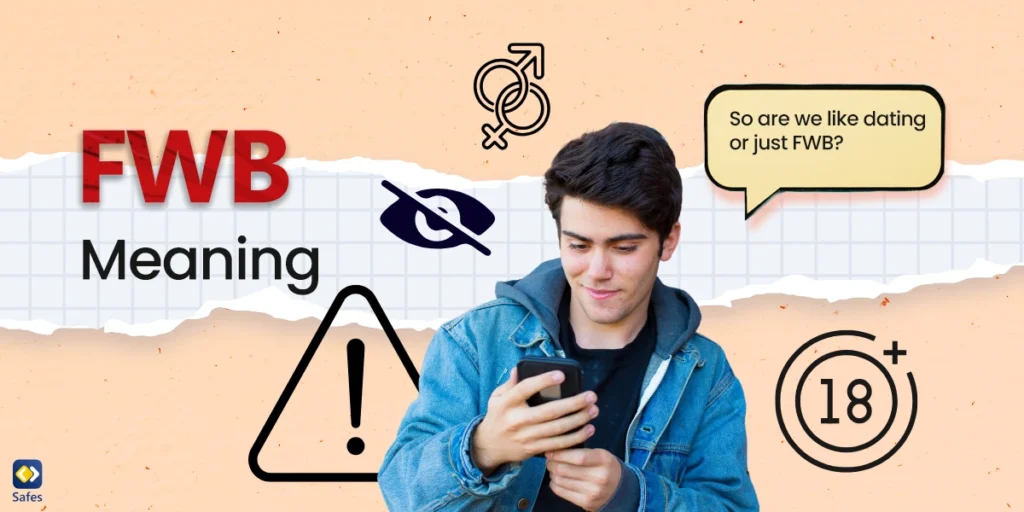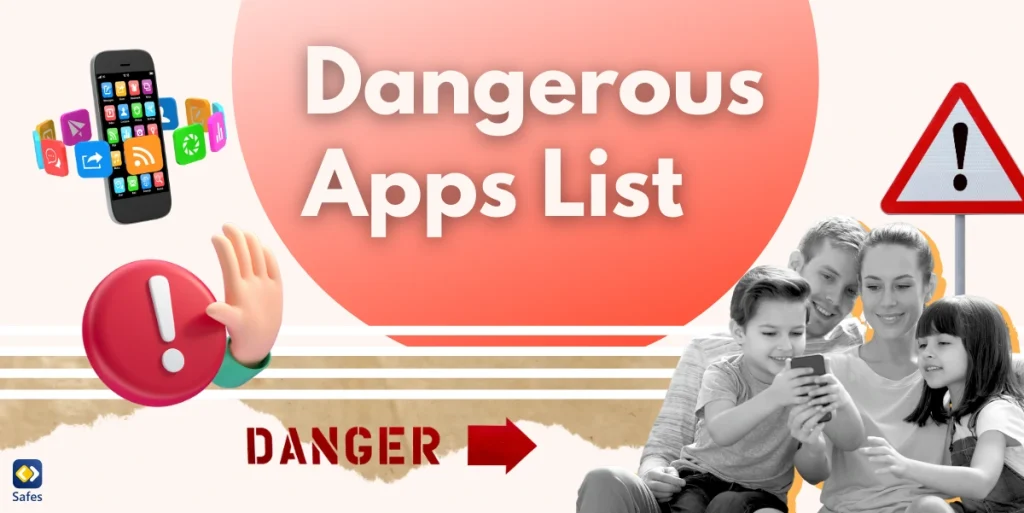Keeping up with the ever-changing world of online slang can be challenging for parents, especially when abbreviations like “FWB” appear in texts, social media posts, or gaming chats. If you’re wondering, “What does FWB mean in my kid’s texts?” you’re not alone. While this phrase is widely recognized in dating culture, its use among teens can raise concerns about relationship expectations, peer pressure, and online safety.
Download and Start Your Free Trial of the Safes Parental Control App
For parents, understanding the context and meaning of “FWB” is crucial in staying informed about their children’s social interactions. While it might seem like just another internet acronym, it can indicate underlying conversations about mature relationships, emotional vulnerability, or risky behavior. Knowing how and where it’s used can help parents foster open discussions and provide guidance on healthy relationship dynamics.
What Does “FWB” Mean؟
The slang term “FWB” stands for “Friends with Benefits.” It refers to a relationship where two people are friends but also engage in casual, non-committed intimacy. Unlike traditional romantic relationships, an “FWB” arrangement is typically based on physical attraction and mutual agreement rather than emotional attachment or long-term commitment.
For parents, it’s important to be aware that teenagers and young adults often use “FWB” to describe casual relationships. While at first glance it may seem like a harmless abbreviation, it’s important for parents to understand its meaning to stay informed about their children’s online and social interactions.
How “FWB” Is Used in Digital Interactions
The term “FWB” is commonly used by teens and young adults in texting, social media, and online gaming chats. It typically appears in casual conversations where people discuss relationships or flirt. Depending on the context, “FWB” can carry different tones—serious, playful, or even sarcastic.
Examples of “FWB” in Conversations
- “FWB” Meaning in Texting & DMs:
- “So are we like dating or just FWB?” (serious)
- “Lol he thinks we’re FWB but I’m just getting free food” (sarcastic)
- “FWB” Meaning on Snapchat & Instagram Stories:
- A person might post a cryptic message like, “FWB situations never end well 😂” to hint at drama.
- “FWB” Meaning in Gaming Chats & on Discord:
- In some gaming communities, “FWB” can be jokingly used to describe alliances between players, e.g., “We’re FWB until the final round, then it’s every player for themselves.”
Platform-Specific Usage
- TikTok: “FWB” is often referenced in trends, memes, or relationship-related videos. Some users share “storytime” videos about their experiences with FWB situations, while others joke about the emotional risks involved.
- Snapchat & Instagram: Since these platforms favor private, short-lived messages, “FWB” is frequently used in flirty DMs or subtle captions. Someone might post, “Why do all FWB situations end in someone catching feelings? 😂” to spark engagement.
- Discord & Gaming Chats: While less common in the romantic sense, some gamers might use “FWB” in a sarcastic or strategic way, like referring to a teammate they only collaborate with for in-game benefits.

Risk Level Indicator (Parent Alert System)
🔴 Red – Potential safety concerns
“FWB” falls into the red zone because it refers to casual, non-committed relationships that involve intimacy, which can raise concerns for parents. While some young adults may use “FWB” in a mature and consensual way, for teens, it can indicate risky behavior, emotional vulnerability, and potential exposure to unhealthy relationship dynamics. If a teen is frequently using this slang in texts, social media, or gaming chats, it might be a signal for parents to check in, encourage open conversations about relationships, and ensure they understand boundaries, consent, and emotional well-being in digital interactions.
Trend Tracker: Is It Still Relevant?
🔥 Trending (widely used now)
As of March 2025, the slang term “FWB” remains a commonly used and recognized phrase in online conversations, dating culture, and social media interactions. While it may not be experiencing a sudden viral surge, it has maintained its place as a staple in relationship discussions, especially among teens and young adults. Unlike fleeting internet slang that fades quickly, “FWB” has proven to be a long-lasting term in digital communication. It continues to appear in text messages, memes, TikTok discussions, and dating app bios, showing that it’s still relevant in modern conversations about relationships and casual dating. Parents should be aware that even if it’s not trending in a flashy way, it’s still actively used and widely understood in social circles.
Online Safety Considerations
The slang term “FWB” is primarily used to describe casual relationships, but it can sometimes be linked to concerning online behaviors. In digital spaces, especially among teens, “FWB” may be used as a secret code to discuss relationships discreetly, making it harder for parents to recognize potential risks. It can also be manipulated in unhealthy ways, such as:
- Grooming Tactics: Predators may use terms like “FWB” to introduce inappropriate conversations in chat apps, social media, or gaming platforms.
- Peer Pressure & Exploitation: Teens might feel pressured into FWB relationships, sometimes due to social expectations or manipulative conversations.
- Cyberbullying & Public Shaming: If an FWB situation turns sour, personal details can be leaked online, leading to embarrassment or cyberbullying.
Advice for Parents
- Stay Aware, But Avoid Overreacting – If you notice your teen using “FWB” in texts or online chats, try to understand the context before assuming the worst.
- Have Open Conversations – Instead of banning or scolding, ask questions like, “I saw this term being used a lot—what do you think it means?” to start a discussion.
- Monitor Online Activity Wisely – If necessary, use iPhone parental controls or content monitoring tools to keep an eye on social media and messages without invading privacy.
Encouraging a trust-based approach will help kids feel comfortable discussing relationships and online interactions without fear of punishment or secrecy.

How Safes Can Help
Keeping up with digital slang like “FWB” can be challenging, but parental control apps like Safes provide an extra layer of awareness and protection. Safes, available for both Android and iOS, helps parents monitor online activity, set content filters, and stay alert about concerning conversations. With features like screen time management and app usage reports, Safes enables parents to stay informed without invading their child’s privacy.
Try Safes for free today and take a proactive approach to online safety!
Conclusion: Why Awareness Matters
As digital slang continues to evolve, “FWB” remains a widely used term, particularly in conversations about relationships and dating. While it may not always signal immediate concern, context is key—what may seem like casual slang could indicate deeper emotional or social challenges for teens.
By staying informed, maintaining open communication, and promoting online safety, parents can help their children navigate these conversations with confidence and awareness. Instead of reacting with fear or strict rules, engaging in trust-based discussions allows teens to feel comfortable seeking guidance about relationships, boundaries, and personal well-being. Ultimately, understanding digital slang is not about policing kids but empowering them to make safe and informed choices in both online and offline interactions.
Your Child’s Online Safety Starts Here
Every parent today needs a solution to manage screen time and keep their child safe online.
Without the right tools, digital risks and excessive screen time can impact children's well-being. Safes helps parents set healthy boundaries, monitor activity, and protect kids from online dangers—all with an easy-to-use app.
Take control of your child’s digital world. Learn more about Safes or download the app to start your free trial today!




